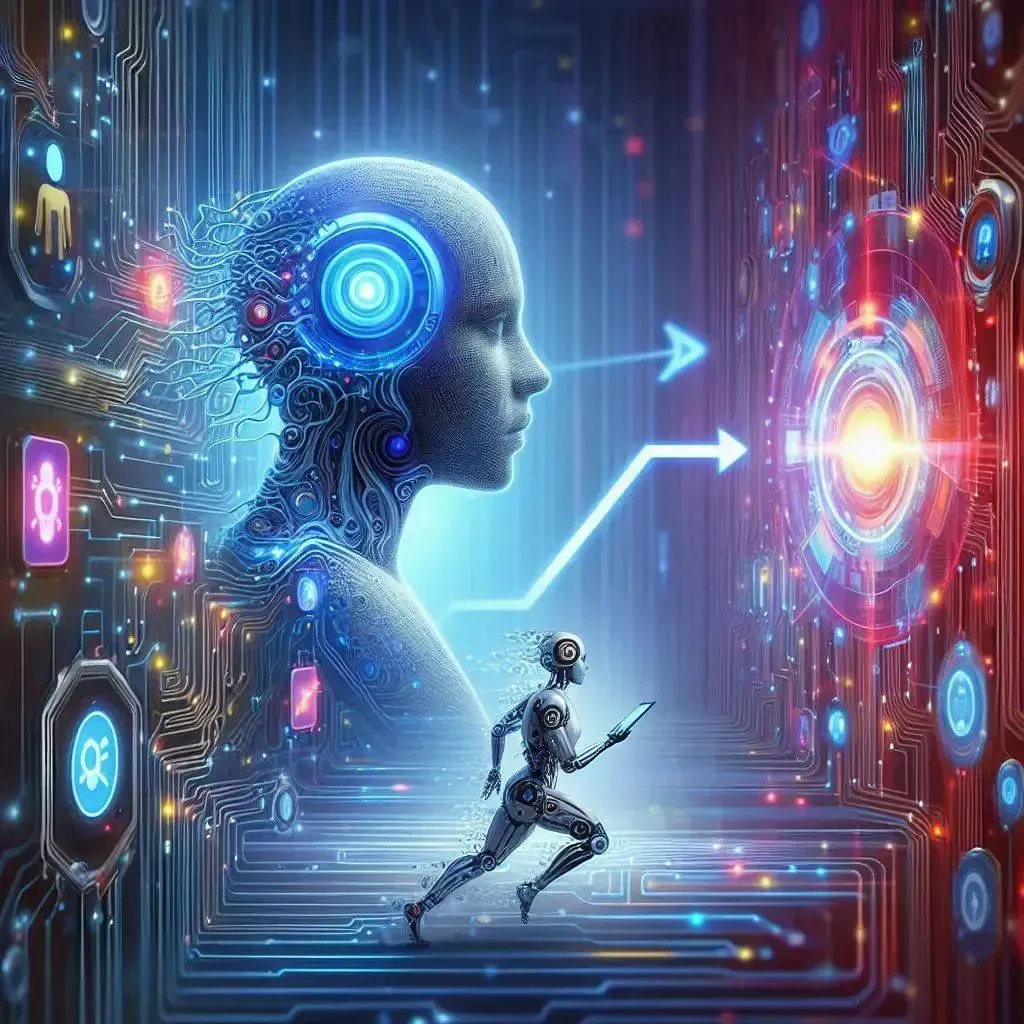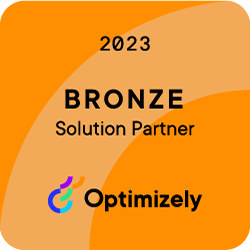AI Search and How its Evolving
Michael Holloway | 19 September 2024
In 2024 alone, AI search has made massive strides with tech giants pushing for faster and more dramatic steps on a seemingly weekly basis, and this isn’t about to slow down anytime soon.
We’ve seen PMAX take off as a massive part of PPC campaigns, autonomously reaching customers in effective ways with some incredible efficiencies. Whilst in SEO we’ve seen the content and AI evolve with Google updating guidelines, using AI within updates and most crucially the introduction of AI overviews impacting content strategy for us all.
But how did we get here and where do we expect to go next? The first point is easy enough (re-typing what's already happened usually is!), but looking forwards to where we may be going is a much tougher task.

To quickly outline what we’ve seen so far...
In 2020 OpenAI launched GPT-3 in an open beta, this didn’t really attract mainstream attention or interest at this point in time as it was mainly utilised by developers and researchers. In 2021 this began to change, where the impact of GPT began to be felt off the back of work produced by these developers and researchers.
Google was also keen to get early adoption of AI with the launch of PMax in November 2021. PMax enabled AI to utilise a variety of targeting, optimisation, asset management and ad placement across channels which was previously not available to paid search marketers. Whilst an early step, it was certainly a big one.
We then take a bit of a jump forward to 2023 where Microsoft integrated GPT-4 into Bing, a move which saw Bing experience a slight uptick in market share – largely curious SEOs like myself trying to see whether we should head to the job centre first thing in the morning. This prompted Google to, perhaps hastily, launch Bard which saw its fair share of early teething issues such as a mistake in the live demo, wiping $100bn from parent company Alphabet’s share price.
Both Bing Chat and Bard have then evolved again into Copilot and Gemini which are claimed to be more reliable, more robust, multimodal models which can support a much wider range of tasks ranging from search and writing, to image creation and coding. These new search formats have prompted many SEOs to consider strategies, particularly around content. With a greater emphasis on longer tail queries and naturally formatted long form content to rank for AI overviews as a core consideration.
So, there we go, that was the easy part, now for some more tricky predictions which hopefully don't leave me looking too silly in the next few months or years!
What can we expect?
While past advancements focused on flashy innovations, the future of AI in SEO and PPC will likely emphasize refining existing technologies to enhance user experience. This means more accurate search results, better ad targeting, and improved content personalisation. SEOs and PPCs can expect AI to provide deeper insights into user behaviour as we look to enable more effective and efficient marketing strategies.
Whilst there may be fewer headlines as we are more used to AI in daily life, these are the changes which really matter to provide a powerful, functioning tool. I know for one that I'll benefit more from getting accurate outputs than from AI integration into my car, but we all know which one would drive more clicks.
Understanding
The most clear and obvious expectation is improved understanding of complex queries and the ability to understand context behind search in order to serve users content which is relevant, and high quality. This improved understanding is potentially the most crucial component in evolving AI, if you get responses which don't match your original query then the tool isn't doing its job, which is very similar to traditional search!
Understanding is also not only on the side of the AI to understand us, but also us to understand AI to get the most out of it as users and SEOs. This blog succinctly outlines how traditional search marries up to generative search as, for all their differences, they have many similarities.
Language
Currently AI predominantly functions on English due the US leading the charge, there are a multitude of other languages with AI proficiency but there are many not quite there to the same standard just yet.
With initiatives such as Meta’s “No Language Left Behind” project, AI accessibility to other languages will only continue to develop. This is obviously a benefit to companies and SEOs as expanded userbases means we can reach a wider array of customers through effective SEO. However, its not just a business and SEO thing, language is a barrier to understanding culture and exploring the world, AI can help to break down that barrier with fast, accurate translation.
Imagine going to another country with not just a different language, but a different alphabet (or multiple alphabets for some countries) and being able to engage with people. Features like this can revolutionise how we experience the world we live in and explore, building an appreciation for cultures in a way we may not have been able to before.
Personalisation
As AI learns more and builds up more data on users we can expect to see more personalised outputs. This is where I'll make a prediction, Google will have a massive advantage into personalisation over companies with less tech involved in our daily lives.
For example, Google owns the android operating system, it's the biggest search engine, it owns the second largest search engine – YouTube, Google maps is the most popular navigation app, Google owns Fitbit and other health products, if you use Gmail Google knows your events and upcoming plans, whilst also expanding into home customisation.
Combining all of these assets, a Google AI – whether that's Gemini or a future evolution – could build a profile of each user so comprehensive that your oven turns on when you’re out on a run because Google knows your 5k time and that you planned a quiche for dinner.
Considering the above, we may finally be moving towards the promised land of Back to the Future 2! Alternatively, we could be walking into I-Robot as these developments don’t come without ethical considerations and consequences.
Speaking of...
What does AI mean for ethics?
These advancements don’t come without significant ethical concerns varying from environmental to privacy and of course bias. Particularly as AI gets more powerful and efficient, these are very real areas for consideration or at least awareness within the search space.
Bias
Bias is an intriguing one as it relies upon a few different areas where bias can be introduced, from the training data or the sampling through to the algorithm itself or implicit / unconscious bias from the developers.
For example when we were testing early AI releases whenever you asked about a CEO the AI provided the response with a male gender, vs a service role the AI gave a female gender. This is likely caused by bias in the original training data set or (hopefully) unconsciously from the developers.
Some examples will be less clear cut though but can have a significant impact on the overall output, particularly with more complex queries and tasks where the early bias spreads further and further into the response. For a user, we have to use a bit of critical thinking with outputs to assess whether bias is in the outputs we receive.
Environmental
If you’ve been lucky enough to read my previous blog on the impact of Page Speed on Carbon Expulsion, then you’ll be all clued up and ready to go here. If not (why not??) then you can find it linked above to go have a scour over!
Gone and read it? Amazing!
Now, considering we already know that search emits more carbon than the aviation industry every year, we have to face the reality that AI search uses 4 to 5 times more energy than traditional search. Thats the equivalent of ~180 million flights per year just on people using AI to search (assuming total AI search takeover) which doesn't even begin to cover the wide range of other services AI provides which also requires energy.
Whilst AI can hopefully help us to come up with and improve efficiency for new solutions aiding in the fight against climate change, for now it's something to be aware of. So, for those shorter, simple searches, we are better off sticking to traditional search.
Privacy
As we’ve touched on above, there is incredible scope for personalisation when an organisation such as Google has access to so much data on individuals. However, this personalisation presents real fears for privacy, what if all that personal data doesn't stay locked away at with these big companies?
Whilst this isn’t just a concern about AI (I’m sure we all have a myriad of personal data already with these companies), AI accessing this data can have potentially greater consequences.
Due to the ability of AI to process and analyse vast swathes of data, coupled with autonomous decision making and predictive capabilities, this raw data can turn into significant, accessible value for organisations.
Take health data for example, if you look back to COVID and the amount of people starting the couch to 5k, AI could build a record of all the tracked metrics from any wearable fitness device and use it to predict your chances of having a heart attack in the next 5 years, autonomously pulling data from a number of sources. This data would be very useful for an insurance company and lead to “bespoke fees” (price gouging).
This may feel like a bit of fear mongering, but I don’t believe the above is far-fetched at all, powerful data interpretation has always been a force within companies and industries looking to maximise profits, AI can just make them more efficient at it.
So where does that leave us in general?
There are many other potential concerns, ranging from misinformation campaigns, to the use of AI in surveillance and deepfakes, but AI advancements are coming no matter what. With initiatives like the International AI Treaty, we can hope the powers that be are looking towards ways to get the most out of AI whilst mitigating the risks.
Plus, whilst there are valid concerns about AI, we also cant deny the exciting potential it brings to our day to day lives. For one, I’m useless at coding, but now through tools such as Cursor AI and Claude AI, I can build a few nice webpages and explore a bit more than I would be able to before.
AI opens avenues that we can use to explore our curiosity, learning more and faster than we potentially could before. I’m a bit of a realist, but the prospect of being able to explore more, break down barriers and perhaps even achieve more than I would before, excites me.
SO! What do you think about AI? Is it something to be feared and shunned? Is it a gleaming light to help us achieve more as a society? Or is it (more likely) something inbetween? A useful tool to help us achieve, whilst we maintain a healthy amount of suspicion and awareness that its not a faultless solution to our problems.
What does this mean for search?
Whilst I cant answer the above for you, from a pure search perspective we’ve been through an interesting journey already and we’re only at the start. We’re in a fundamentally different industry the one we were in a few years ago, with new content strategies and new tools flooding the market, the number 1 focus should be on adaptability. Aspects of search are changing on a dime so being open to change and innovation can make a huge difference.
Whether its algorithms, content generation, voice and visual search, mass analysis or the continued development of AI overviews, there is always a new development around the corner in search for us to be ready to receive and adapt to so we can embrace exciting possibilities.
Its never boring in search but if you need a team to help guide and stay ahead of the curve, don’t hesitate to reach out to us!
Want to have a chat?
Chat through our services with our team today and find out how we can help.






